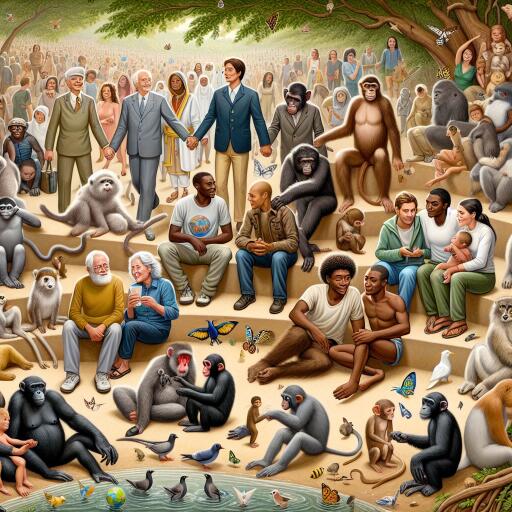
‘A Harmonious Human-Primate Society’: Interview with Whitley Winner Kuenzang Dorji – South Africa Today
In the verdant landscapes of Bhutan, a unique and profound effort is underway, led by conservationist Kuenzang Dorji, to foster coexistence between humans and the endangered Gee’s golden langur. Dorji’s dedication to wildlife conservation has been recognized globally, earning him the prestigious Whitley Award, often referred to as the “Green Oscars.” This accolade honors his tireless work toward mitigating human-wildlife conflicts and protecting the golden langur in Bhutan and is a testament to his innovative approach to conservation.
Originating from a small village in Bhutan, Dorji grew up with a deeply ingrained respect for all living beings, a value taught by his father, a farmer with strong Buddhist beliefs against harming wildlife. These early lessons in compassion laid the groundwork for what would become a lifelong commitment to conservation. Dorji began his professional career as a park ranger, eventually transitioning into research, where his diligent study of the Bengal tiger using camera traps marked him as the first Bhutanese biologist to capture images of the tiger in the wild.
Bhutan’s forests, home to the golden langur, are facing increasing pressures from economic expansion, leading to habitat fragmentation and bringing these primates into closer contact with human populations. Traditionally respected by the Bhutanese people, the langurs are now often seen as pests by farmers due to crop raiding, highlighting the need for intervention.
In response, Dorji has spearheaded innovative conservation strategies to promote peaceful cohabitation between humans and langurs. These efforts include the utilization of heat maps to identify conflict zones, community-driven interventions, and educational programs aimed at changing perceptions and behaviors. One of the more novel approaches employed is the installation of predator mimic devices that deter langurs from entering crop areas, significantly reducing conflict incidents.
Despite the challenges, Dorji emphasizes the cultural and ecosystem benefits of the golden langur, advocating for a holistic approach to conservation that involves the entire community. This engagement has fostered a renewed sense of stewardship among the local populations, leading to innovative solutions to human-wildlife conflicts.
The Whitley Award not only shines a spotlight on Dorji’s remarkable contributions but also provides a platform for sharing knowledge and experiences with a global audience, further amplifying the impact of his work. Dorji is currently furthering his education, pursuing a Ph.D. in biological anthropology and archaeology, which he believes will deepen his understanding of the intricacies of human-wildlife interaction and contribute to his conservation efforts.
Looking to the future, Dorji envisions a society where humans and langurs can coexist in harmony, each benefitting from the other’s presence. He sees the potential for sustainable practices, such as ecotourism, to play a significant role in conservation efforts, providing economic benefits to local communities while ensuring the survival of the golden langur.
For those outside of Bhutan looking to support these conservation efforts, Dorji suggests contributing to organizations focused on wildlife preservation, such as the World Wildlife Fund. He also encourages people worldwide to engage in responsible tourism, which can offer direct support to local economies and conservation initiatives.
Through dedication, innovation, and community involvement, Kuenzang Dorji’s work illustrates the profound impact that one individual can have on the preservation of biodiversity. His message to young conservationists is one of perseverance—encouraging them to devote themselves passionately to their cause, for the recognition and fulfillment of making a difference in the world will surely follow.





Leave a Reply